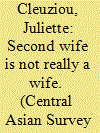| Srl | Item |
| 1 |
ID:
144163


|
|
|
|
|
| Summary/Abstract |
While polygyny in Tajikistan existed before the collapse of the Soviet Union in 1991 and has been a phenomenon of growing importance since Independence, it is still forbidden by law. To understand this renewal, I do not look at polygyny as a sign of religiousness, but as a form of patriarchal bargain in which women (who often experienced former matrimonial disjuncture) may have a greater power of decision in the spousal relations. I will explore women's points of view, from which polygyny is a strategy to accessing the symbolic and material resources they lack. I then explore the conditions to which becoming a second wife is possible: women's own resources, be they material, symbolic, familial, appear as of crucial importance in this accession to the status of being married anew.
|
|
|
|
|
|
|
|
|
|
|
|
|
|
|
|
| 2 |
ID:
168830


|
|
|
|
|
| Summary/Abstract |
This article aims to show how traditionalization is enforced by women in Tajikistan in the realm of marriage, focusing on the economic dimension of life cycle rituals: ritual expenditure and gift-giving. It shows that from women’s points of view, performing ceremonial competition may itself be a resource to recover their reputation, for example when a matrimonial rupture has harmed it. Focusing on single mothers, it demonstrates how practices of traditionalization performed by women can be directed at addressing gender constraints and stereotypes, such as the normative relation between marriage and femininity, and how they may also secure women’s separate sphere of competence and relative financial autonomy.
|
|
|
|
|
|
|
|
|
|
|
|
|
|
|
|